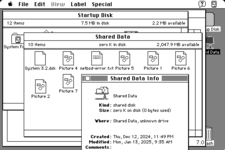thecloud
Well-known member
Leopard was the last version of the Mac OS to support the AppleTalk protocol stack. No version since then has the required support in the kernel, so macOS cannot run atalkd directly. When you fire up atalkd on a macOS host, it will just print an error message and exit. If you want to use a macOS system as a server for System 7 clients (i.e. over AppleTalk instead of TCP/IP), you would need to run a different OS which *does* support AppleTalk in a virtual machine on your Mac.
Your second question is thought-provoking. I'm using Netatalk running in a NetBSD VM on macOS to share a directory on a volume which has over 7GB free. System 7 clients see this share as having less than 2GB free, obviously, but they also see it as using zero K of space, which is clearly not the case. I tried setting legacy volume size = yes in afp.conf and restarting the server, but the results were the same.

Your second question is thought-provoking. I'm using Netatalk running in a NetBSD VM on macOS to share a directory on a volume which has over 7GB free. System 7 clients see this share as having less than 2GB free, obviously, but they also see it as using zero K of space, which is clearly not the case. I tried setting legacy volume size = yes in afp.conf and restarting the server, but the results were the same.

